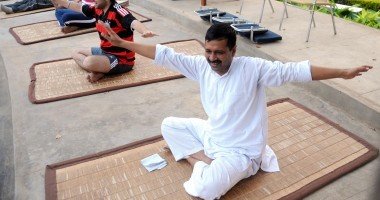Articles features
Kejriwal chose Perfect Victory over Perfect Party (Comment)

From the happenings of recent weeks, it will be tempting to deduce that
Arvind Kejriwal is a Stalinist who, like all autocrats, hates democracy
and dissension and loves yes-men. That's what Prashant Bhushan will
want us to believe. But the stormy story of the Aam Aadmi Party's
internal crisis is far more complicated than such a black-and-white
narrative.
The most curious case in the entire episode is that of
Prashant Bhushan, who now finds himself virtually out of a party that
he and Yogendra Yadav helped Kejriwal to set up amid trying
circumstances in 2012.
When the Mahabharata for Delhi's assembly
was on, Prashant Bhushan's father, Shanti Bhushan, yet another
co-founder of AAP, shockingly trashed Kejriwal, the party's best-known
face. Shanti Bhushan had declared that his first two choices as Delhi's
chief minister would be Kiran Bedi of BJP and Ajay Maken of Congress (in
that order) -- while Kejriwal would be his last option.
The electorate didn't agree. That, of course, is another story.
But
when the campaign for the make-or-break Delhi election was on, Prashant
Bhushan was conspicuously absent. At one point it wasn't clear to even
journalists if he was still in the AAP or not.
For an articulate
lawyer who was so silent during those crucial days, he became hyper
active within days after Kejriwal, virtually rising from the dead,
became the chief minister of Delhi. Along with Yadav, Prashant Bhushan
suddenly began denouncing what he said was the lack of internal
democracy in the AAP. As he came under fire from Kejriwal supporters, he
became more and more bitter.
Even if we assume that all the
allegations hurled by Yadav and Bhushan against Kejriwal are true, it
defies logic why they were not ready to give the chief minister even six
months of peace. Whether one likes it or not, the fact is no one in
Delhi voted for Manish Sisodia or the Bhushans or Yadav. It was Kejriwal
who defeated Narendra Modi.
The AAP had made electoral history.
No institution (AAP included) or individual is perfect. But Kejriwal
should have been given a grace period before taking up issues related to
the party, that too publicly.
Sadly, Prashant Bhushan and Yadav
turned out to be the counterparts of those in the BJP who have tripped
Modi with their loud talk on 'Love Jihad', 'Ghar Wapsi' programmes as
well as verbal and other attacks on minorities.
Modi paid a price
for this in Delhi. The AAP may or may not pay a similar price in the
elections it may contest in the months and years to come.
From
his revelations at the National Executive in Delhi on Saturday, it is
evident that Kejriwal chose to keep quiet all through the elections. But
the volcano burst once the battle got over. Kejriwal had only one
choice before him: lead a Perfect Party to the liking of Prashant
Bhushan and Yadav or aim for a Perfect Victory in Delhi so that the AAP
rises from the ashes. He opted for the latter.
Kejriwal, however,
has not come out of this mess unscathed. Rightly or wrongly, he is
being seen as one who cannot tolerate dissent and who won't accept
people who think differently. Booting out Bhushan or Yadav is one thing
but easing out former Indian Navy chief L. Ramdas, the AAP Lokpal,
without even the courtesy of letting him know that he is being replaced
is another matter.
If the AAP has to do alternate politics, it
cannot treat every dissident as a foe. If Kejriwal is ready, as he said
at Ramlila Maidan, to consult Kiran Bedi and Ajay Maken for the sake of
Delhi, surely he must be more considerate to Ramdas. Courtesy is a
two-way traffic.
(30.03.2015 - M.R. Narayan Swamy is Executive
Editor at IANS. The views expressed are personal. He can be reached on
narayan.swamy@ians.in)





































